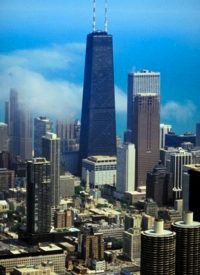
Just four days after the Supreme Court essentially struck down the City of Chicago’s draconian handgun ban as unconstitutional, the City Council unanimously approved a tough new gun-control regime that critics are vowing to fight but supporters are hoping will hold up in court.
The “Responsible Gun Ownership Ordinance,” introduced by Chicago Mayor Richard Daley, will require city-issued “permits,” registration, and special training for residents who wish to own guns. It will also limit the number of handguns eligible gun owners may purchase to one per month. Handguns will not be allowed outside of the home (including in garages or on porches) and must be transported broken down and in a case. They cannot be sold within city limits, and only a list of “safe” guns drawn up by the police superintendent will be permitted.
“Although the [Supreme Court’s] ruling wasn’t what we had hoped for, it was what we expected. That’s why for the last several months we’ve been preparing the reasonable and responsible ordinance to regulate handguns in the home that the council approved today,” said Mayor Daley on July 2.
“Either we enact new and reasonable handgun laws in Chicago to protect our residents — as the council has done — or we do nothing and risk greater gun violence in our streets and in our homes,” he added.
Aldermen (city councilors) generally agreed, as evidenced by the 45-0 vote in favor of the new set of rules that officials admit are probably still the strictest in the nation.
“I find it hard to believe that the Supreme Court justices that voted to strike our handgun laws have spent any time in the communities that many of us represent,” Chicago Alderman Toni Preckwinkle told the Chicago Sun-Times. “There’s no way if they knew the violence our young people face every day that they could decide this was a reasonable course of action.”
Most of the other Aldermen quoted in media reports expressed similar contempt for the high court and its recent 5-4 ruling in McDonald v. City of Chicago. But not all of them went as far.
“We can disagree with the Supreme Court all we want, but … this is the law and we’re going to have to follow it,” said Alderman Ed Burke. “I have to confess that back in 1982, when I was chair of the police committee, that perhaps I and so many others that voted in favor of this ordinance exhibited too much ardor for the ban and we perhaps should have been more sensitive to weighing the rights of legitimate citizens to have weapons.”
But despite the hysteria exhibited by Chicago officials about more guns leading to more crime, empirical evidence suggests the opposite is true. And gun-rights groups, especially the National Rifle Association, have already blasted Chicago’s new ordinance.
“There are numerous problems,” said NRA spokesperson Alexa Fritts, referring to the new regulations. “It is extremely restrictive and completely against the intent of the Supreme Court ruling. It is ludicrous for someone to fear prosecution for fending off an attacker in their garage.”
In Illinois, NRA lobbyist Todd Vandermyde also criticized the new restrictions and vowed to attack them from various angles. “The city wants to put as many hurdles and as much red tape in the way of someone who just wants to exercise their constitutional right to have a gun,” he said, blasting the ordinance as discrimination against the poor. “How are some people in some of the poorer neighborhoods who merely want to have firearms for self-defense supposed to afford to get through all this red tape?”
Though he didn’t say when a lawsuit would be filed, he indicated that the city’s actions would be challenged in court. And while some gun-rights activists predict another slap down for the city, Mayor Daley and his cohorts are confident the rules will be upheld.
But the outcome of any legal challenges remains very much uncertain, since the Supreme Court ruled that “reasonable restrictions” were still permissible under the Second Amendment. Just what exactly “reasonable” means is hard to know.
“It is important to keep in mind that Heller, while striking down a law that prohibited the possession of handguns in the home, recognized that the right to keep and bear arms is not ‘a right to keep and carry any weapon whatsoever in any manner whatsoever and for whatever purpose,’” wrote Supreme Court Justice Samuel Alito in the majority opinion rejecting Chicago’s outright ban.
“We made it clear in Heller that our holding did not cast doubt on such longstanding regulatory measures as ‘prohibitions on the possession of firearms by felons and the mentally ill,’ ‘laws forbidding the carrying of firearms in sensitive places such as schools and government buildings, or laws imposing conditions and qualifications on the commercial sales of arms.’ We repeat those assurances here,” he added.
If a person must beg the government for permission to exercise a “right,” it isn’t a right at all; it’s a privilege that can be taken away or denied at any time. Rather than squandering tax dollars on costly litigation to defend the city’s infringements against the right of the people to keep and bear arms, Chicago’s politicians should quit trying to interfere with residents’ God-given right to defend themselves.
Despite 30 years of some of the strictest gun regulations in America, the Windy City continues to top the charts in terms of murders and crime. Obviously, murderers are not concerned with violating gun laws — Chicago has proven this beyond any doubt. It’s time for the city’s ruling class to get a clue.



